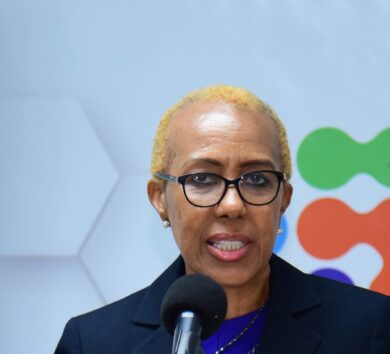
Face-to-face learning resumed on Monday (January 3) and, according to Education Minister Fayval Williams, saw the reopening of 608 schools in total.
Williams, while speaking at today’s first post-Cabinet press briefing for the year, reported that of the 608 schools reopened for the Easter term, 568 are primary schools, 30 are secondary schools and 10 are infant schools.
Although face-to-face learning resumed for 2021, there are still a number of schools that are utilising the virtual space. According to Williams, who is also the information minister, 173 primary schools and 120 secondary schools did not revert to the physical space.
The minister, who described the attendance turnout as “mixed”, announced that full attendance was seen in smaller primary schools while larger schools had an expected relatively low attendance.

Williams attributed the larger schools’ low attendance to the early days in the reopening of schools, the rotation approach taken on by most institutions and the staggered resumption. Despite the low turn out, Williams explained that, as the days go by, it is expected that more students will attend face-to-face classes.
The majority of the schools that have resumed physical learning have not reported any issues, however of the 608 schools reopened, a little over 20 have made reports to the Education Ministry.
“There are some schools that reported to us… those were 23 schools… reported that students or teachers would have called in to say that they have flu like symptoms and were remaining at home,” Williams said.
She continued, detailing that a report was made of a COVID case from one institution.
“In one instance there was a school that reported the principal having called in to say that he had tested positive for COVID and was remaining at home. There was another instance in which a teacher had called in to say that they had to be quarantined at home for some period of time.”

Aside from COVID and flu-like symptom concerns, the education minister shared that an ongoing fight being faced, is the issue of termites within schools. So far, about two reports have been made on the matter.
“That situation gets worse when our schools are closed and there’s no human being moving around at the school. We spent millions of dollars during the last school year dealing with the termite issues but, of course, it is ongoing, and so we continue our efforts in that regard,” Williams said.
Addressing the plans to remedy the learning loss that the student population has suffered, Williams outlined several actions the Education Ministry intends to take to tackle the issue.
Beginning this year for the early childhood sector, the Age 4 Assessment of students will be done in an effort to gauge the level at which they stand, in terms of early literacy and early numeracy, so learning can be customised if needed.
“If we do it at age four, we will use the next year of their lives, age five, to do the necessary intervention so by the time they become six years of age and are ready to go to primary school they will be in a better state to take on the work at the primary school,” Williams explained.

Those at the primary level in grades 1 and 2, will undergo testing to also gauge the level at which they stand.
Specialised teachers have already been placed in the system to tackle eight subject areas.
“We are expecting to see improvement in Mathematics, in English, and in the eight subject areas in which we have these specialist teachers. We are beginning with about 230 of our primary schools and we will add more as we move into successive terms.”
For students entering secondary institutions, the Primary Exit Profile (PEP), will contain information on where they stand in terms of their learning, which will indicate if there is a need for intervention.
For students matriculating to sixth form programmes, Williams shared that the recently implemented Pathway programmes will serve in helping the students recover from the learning loss. For other secondary students, teachers will be responsible for identifying where students need help.
In addition to these measures, Williams announced that the National Homework Support Programme will be implemented in a more vigorous way to also help students recover from learning loss.







Comments